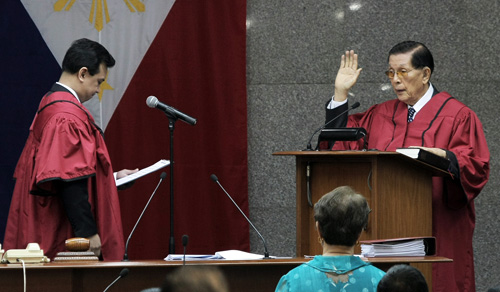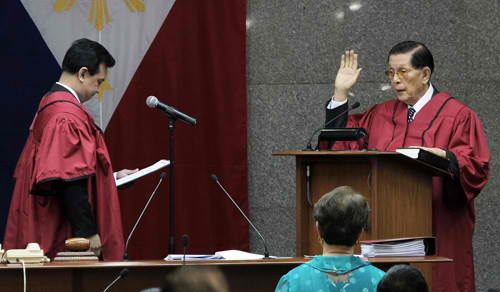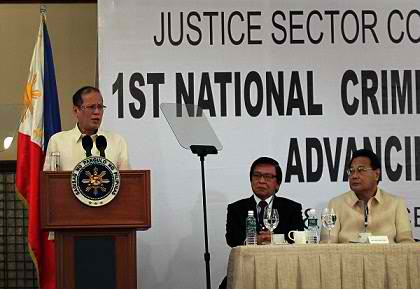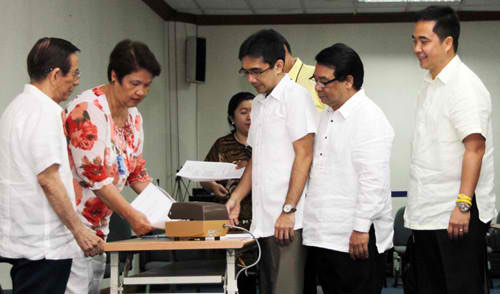
By ELLEN TORDESILLAS
Expect Senator Antonio F. Trillanes IV to call a spade a spade.
![]() In his speech at a forum held at the UP National College of Public Administration and Governance, Diliman last week, Trillanes said, “… the over-arching policy issue in this whole impeachment episode is, whether the conviction or acquittal of Chief Justice Renato Corona would be good for our country.”
In his speech at a forum held at the UP National College of Public Administration and Governance, Diliman last week, Trillanes said, “… the over-arching policy issue in this whole impeachment episode is, whether the conviction or acquittal of Chief Justice Renato Corona would be good for our country.”
Unlike other senators who give hypocritical statements that they will decide solely on evidence presented, Trillanes said, “ My verdict should not be based solely on evidence as it (the impeachment trial)now becomes a matter of public policy.”
But it doesn’t mean, he said, that he will ignore the evidence that will be presented by the prosecution.
“Definitely not!, “he said adding that “the strength or weakness of the evidence, and how they are presented could very well affect the political acceptability of either policy alternative. “
A non-lawyer, Trillanes, formerly a military official and the youngest member of the Senate, said the past several weeks he researched on the true nature of impeachments to guide him on how he should make a decision on Corona’s case.
He said he focused on the US version of impeachment where the Philippine impeachment process is based.
“” True enough, “ he said. “What I found out was, there is not a single book or reference I encountered that says that impeachment is a judicial trial solely based on evidence. To the contrary, all of these references defined or referred to impeachment as a political process. “
Highlights of Trillanes’ speech:
“Having established that impeachment is a political process, therefore, my verdict should not be based solely on evidence as it now becomes a matter of public policy. And the over-arching policy issue in this whole impeachment episode is, whether the conviction or acquittal of Chief Justice Renato Corona would be good for our country? To resolve this, I intend to use political acceptability as the sole criterion to evaluate the projected outcomes of either policy alternative of conviction or acquittal. To determine political acceptability, I intend to use policy research tools such as quantitative and qualitative researches and stakeholder analysis. These, along with extensive consultations, could very well filter the noise of the mob and undue media influence from the true will of the people.
“One might ask, if we were representatives of the people and, therefore, entrusted with the authority to decide on our own what is in the best interest of the public, then why wouldn’t we just decide, based on our own personal and ideological values? If the decision was merely for ordinary pieces of legislation, then I would not hesitate to use that prerogative. But an impeachment of the Chief Justice of the Supreme Court is not a daily occurrence and it has very serious short-term and long-term implications to our fragile Democracy. So, I believe, getting as many people involved in the decision-making process is very much warranted.
“Again, one might ask, as one of my colleagues did, why don’t we just conduct a referendum to resolve this dilemma? Well, the answer is quite simple – our country is not a direct democracy. We are, in fact, a representative democracy wherein the people indirectly govern their country through elected representatives. It is the representative’s discretion whether to consult his constituents or assume that he is omniscient. More importantly, referendum is not the procedure stated in our Constitution.
“This does not mean, however, that the evidence should be completely disregarded. Definitely not! Because the strength or weakness of the evidence, and how they are presented could very well affect the political acceptability of either policy alternative. Having said this, it would help if the prosecutors and defense counsels would not to be too technical in their presentations. Ultimately, they would have to win the hearts and minds of the people.
“As regards the appreciation of evidence, we have to bear in mind that the Constitution and the Senate Rules of Procedure on Impeachment Trials did not specify the quantum of evidence required to convict. Is it beyond reasonable doubt as what is used in criminal proceedings? Is it preponderance of evidence as what is used in civil cases? Or is it substantial evidence as what is used in administrative proceedings? Since it is not specified, therefore, a senator can just raise or lower the quantum of evidence required to suit his or her inclination.
“In the end, regardless how the impeachment trial ends, it will be one of the defining moments in our nation’s history as we would have shown the whole world that our Democracy works.”
(The article was posted on Jan. 8 on the author’s blog.)


